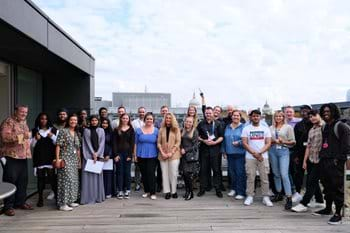Class discrimination is a thing of the past in the UK. Right?
Wrong. Research shows 39% of people holding the 5,000 top jobs went to private school – five times the population average. Meanwhile, someone from a working-class background earns on average 16% less than someone from an upper-middle-class background doing the same job.
For young people, the picture is even bleaker. Studies show a disadvantaged young person is twice as likely to be unemployed versus their better-off peers. This discrepancy is never more obvious than in the apprenticeship space, where just 5% of degree-level apprenticeships currently go to young people from lower-income areas.
While these statistics might make you sit up and take notice, they aren't the whole story. Class discrimination doesn't only impact people economically; it also has complex and nuanced psychological, emotional and cultural ramifications that limit people's opportunities. That's why, as with any social justice issue, it's crucial to draw on lived experience when taking action against social inequality.
So, how can you draw on lived experience to eradicate class discrimination in your apprenticeship programme – and even your wider business? Here are our four top tips.
1. Create a safe space to talk about social inequality
Do you talk about social inequality in the workplace? As with any diversity challenge, awareness of the issue is the first step towards resolving it. Make sure you're creating a safe space to talk about class – for example, you could talk to leadership teams about their experiences, create a dedicated employee network for your discussion around social equality, or even circulate an anonymous internal survey to ascertain your business' current social mix.
This is about listening and learning from the people in your business, giving them an opportunity they might not previously have had to share their experiences, constructively criticise business practices, and suggest ideas for positive reform. You might be surprised at the wealth and knowledge you already have without realising it.
2. Make sure your social mobility partners have lived experience
If you work with an organisation to develop and execute your apprenticeship programme, make sure they're qualified to act in the best interests of those from disadvantaged backgrounds. If they can't draw on lived experience, ask yourself if they truly understand the issue beyond surface-level statistics? As custodians of the young people you're hiring, it's imperative you understand their potential vulnerabilities and how to overcome them in a way that benefits everyone involved.
At Visionpath, we believe our greatest strength – the thing that truly sets us apart from our competition – is our lived experience. Our founder Patrick dreamed up the idea for a social enterprise that helps inspire, engage and hire socially diverse school leavers after his own experience of social inequality, because he believed a young person's background shouldn't limit their potential.
"I went to a failing school with no careers advice and my family background meant I didn't have access to networks and finances that help smooth a path," Patrick explains. "I started Visionpath to help others like me to level up with fairer career access and to help employers tap into the socially diverse talent they've been missing out on."
3. Connect with people who are experiencing social inequality
We know people from disadvantaged backgrounds have fewer role models, career advisors and networking opportunities available to them. So, why not create them?
Launching a mentoring programme can be mutually beneficial: you can positively influence young people's career success and earning potential by partnering them with someone more experienced in their chosen field for guidance. Meanwhile, they can offer invaluable authentic insights into the challenges faced by people from lower-income backgrounds that can inform your equality strategy going forward, and the mentoring experience can be powerful development for your people too.
4. Foster strategic school partnerships
Sure, forging partnerships with local schools makes sense because it creates a talent pool for your apprenticeship programme. But which schools you choose to work with is key if you want to positively impact social equality.
Even if your business is based in a seemingly affluent area, there may be social mobility cold spots. So, don't just go with the obvious choices. Instead, identify local schools with higher levels of disadvantage where your business can have a greater impact. Then foster long-term, sustainable relationships that empower next-generation talent, while inspiring and upskilling your team.
Not sure where to start? We can help you access lived experience to improve your business' social diversity with anything from managed school partnerships and mentoring programmes, to apprentice-hiring and manager training.
If you want to see all young people afforded equal opportunities for their future career, get in touch.
























































